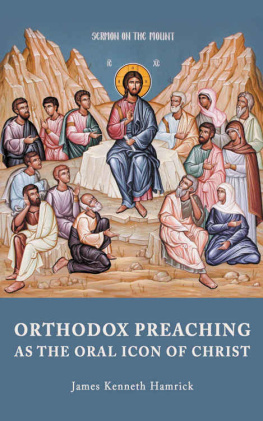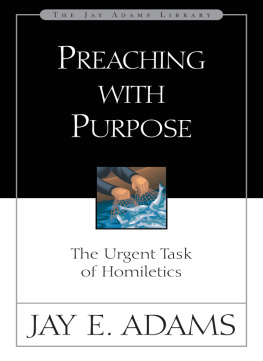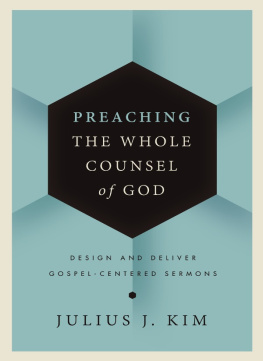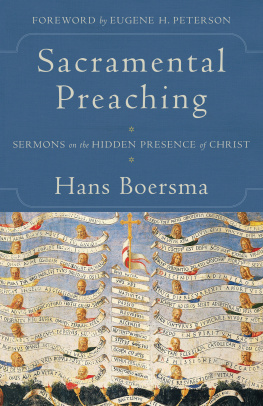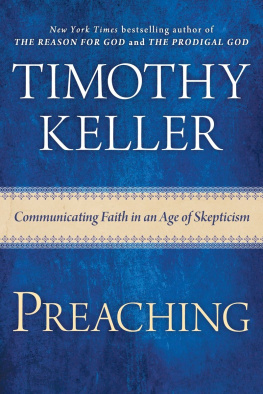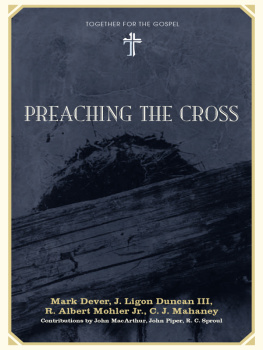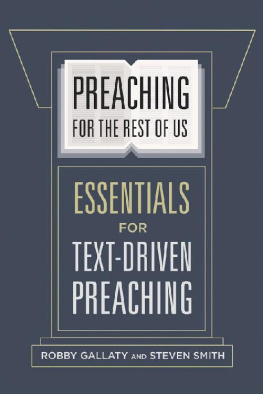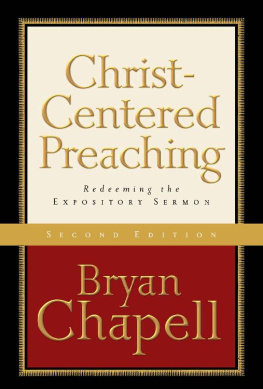
ORTHODOX PREACHING
AS THE ORAL ICON OF CHRIST
James Kenneth Hamrick
Orthodox Logos Publishing
ORTHODOX PREACHING
AS THE ORAL ICON OF CHRIST
by James Kenneth Hamrick
2013, James Kenneth Hamrick
Book created by Max Mendor
2015, Orthodox Logos Publishing, The Netherlands
www.orthodoxlogos.com
ISBN: 978-94-92224-01-9
A master's thesis submitted to the faculty of the Antiochian House of Studies in partial fulfillment of the Master of Arts, Balamand University, Orthodox Patriarchate of Antioch.
This book is in copyright. No part of this publication may be reproduced, stored in a retrieval system or transmitted in any form or by any means without the prior permission in writing of the publisher, nor be otherwise circulated in any form of binding or cover other than that in which it is published without a similar condition, including this condition, being imposed on the subsequent purchaser.
Contents
To the memory of Archpriest Peter E. Gillquist (July 13, 1938July 1, 2012),
a mentor and fellow laborer in Christ who encouraged me in this endeavor, and who truly appreciated the essential place of preaching in the Orthodox Christian faith.
It is not what he says which is important, but the Spirit which animates it, the Spirit which nourishes his heart and tongue, which gives shape to his sayings and transforms the stones of his speech into icons.
Archimandrite Vasileios,
Hymn of Entry: Liturgy and Life
in the Orthodox Church
Foreword
I had the pleasure to work with Father James Kenneth Hamrick on his Master Thesis entitled, Orthodox Preaching as the Oral Icon of Christ. This oral icon of Christ is very dear to all the faithful, and forms an essential function of our mission in the Church. It is extremely important to resort to preaching that enables the deprived people to reach the depth of the Orthodox doctrine. This book in hand serves as a very useful tool toward reviving evangelization
in the Orthodox Church. Many persons, clergy and laity, will benefit greatly by taking heed to the significant material presented in this book.
Clergy and lay persons alike should consult this book to find inspiration for a clearer grasp of the rich tradition of preaching which is our legacy and an expression of our vital spiritual life
in Christ. The insights and contributions of Father James will not go unnoticed or unappreciated. Therefore, clergy looking into proclaiming the Gospel in an Orthodox way will be enriched with this work. He has in view the edification of all our churches
in declaring the message of Christ within Liturgical context.
Finally, in return I would extend my heartfelt and unqualified endorsement of this project.
The dissemination of this material should be encouraged throughout the Orthodox world.
V. Rev. Michel Najim, Ph.D. Saint Nicholas Cathedral, Los Angeles, California
Preface
My appreciation for fine preaching began to develop during my childhood years under the preaching and nurture of my father, the late Reverend Kenneth Carl Hamrick, a Methodist minister for over 30 years. In my own journey of faith from the Protestant tradition to the Orthodox Church, I have been exposed to a broad array of preaching styles: from firebrand revival and Pentecostal preaching, to traditional African American preaching, to the oratorical and solemn style of high church preaching, and to the less formal teaching-style of expository preaching that is typical in much of the evangelical Christian tradition. While my own preaching skills have been shaped and influenced by a number of fine preachers from a variety of these traditions, in the years of my pastoral ministry leading up to my conversion to Orthodoxy, I grew increasingly alarmed and dismayed with the trajectory of Christian preaching in our time.
Drifting further and further from its Orthodox roots, the preaching of Christ crucified in our society has given increasing ground to the militant liberalism and pluralism inherent in most mainline seminaries, as well as to the egomaniacal showmanship and antics of preaching charlatans more interested in self-promotion and the emotional manipulation of crowds than in true theological and spiritual integrity. Undeniably, a crisis of preaching presently exists. And while, on the one hand, much of Protestantism has exalted the importance of preaching over the Eucharist, on the other hand, quality preaching in the liturgical traditions, including Holy Orthodoxy, has suffered for a lack of significance and emphasis given to the holy work and discipline of effectively preaching
the Good News of God in Christ. This crisis of preaching ranges from otherwise accomplished preaching and oratory within Protestantism plagued by a detachment from the dogmatic and patristic moorings of Orthodoxy to preaching that is Orthodox and theologically correct but that is nevertheless so dry and unimaginative that even the worst sufferer of insomnia is capable of nodding off. Therefore when I set out to complete my masters degree through the Antiochian House of Studies and the University of Balamand, I immediately realized that my thesis research and writing should focus on preaching.
Early on in my research, I discovered an obvious lack of books and articles written on preaching from an Orthodox perspective. Quite frankly, I was stunned. How could the Church of Saint John Chrysostom, Saint Ephraim, Saint Peter Chrysologus and the other great patristic preachers have grown so silent and sidelined within modern scholarship on such a vital aspect of our Christian witness? It would be tantamount to Orthodox theologians having little to say about the Holy Mysteries or the liturgical life of the Church. My own assessment concerning a lack of materials on Orthodox preaching was further reinforced during my recent visit to the Institute for Orthodox Christian Studies at Cambridge University. Professor David Frost, the principal of the Institute, told me that Metropolitan Paul Yazigi (currently an abductee in Syria) had visited a couple of years earlier in order to obtain books and materials on Orthodox preaching for his priests. Professor Frost told me that he had to respond to the Metropolitan, Your Eminence, Im afraid we have very little in our library on that subject. Where is the Orthodox voice among the plethora of homiletical research and writings being produced by Protestant and Roman Catholic scholars and practitioners? Yes, we may certainly benefit from the work of our brethren, but surely Holy Orthodoxy has something to offer in the discipline of homiletics.
From my research, I have found that the Orthodox Church indeed has much to offer on the subject of preaching. It is just
a matter of appropriating and constituting those materials in order to make them available to the student, scholar, and layman alike. My hope and prayer is that this book will in some small way help to fill that need, though certainly much more work needs to be done. While this book derives from a peer-reviewed academic paper, I am hopeful that it will nonetheless be accessible to not only my fellow clergymen and homiletical scholars, but to all who want to better understand the vital importance of preaching from an Orthodox perspective, to those that wish to better appreciate the fullness of preaching in the context of the whole liturgical and Eucharistic life of grace.
Finally, as we consider the world in which the Apostles were sent to evangelize two millennia ago
a pagan world that was largely hostile to Christianitywe find ourselves and the Church in this post-Christian age facing a very similar world with very similar challenges. My research will prayerfully convey the truth that regardless of where we are situated in time and place, and that regardless of what particular style of preaching we might employ in heralding the Gospel of Christ, that it is Orthodox preaching by virtue of its iconic nature which mediates the very presence of our Lord whereby lives may be transformed. As a priest and pastor, the research that I conducted in writing this book has helped to transfigure my own preaching ministry. It has helped me to realize the power of God through the Holy Spirit in making manifest His own divine presence through the proclamation of the Gospel, and to more fully recognize and acknowledge the awesome and weighty importance of our sacred call to faithfully herald the Good News of Jesus Christ. For as proclaimed by Saint Paul, Woe to me if I do not preach the gospel! (1 Cor. 9:16, RSV). May we all who have been called to be bearers and heralds of the precious gift of the Gospel approach our work with diligence and faithfulness, with thanksgiving and reverent fear.

